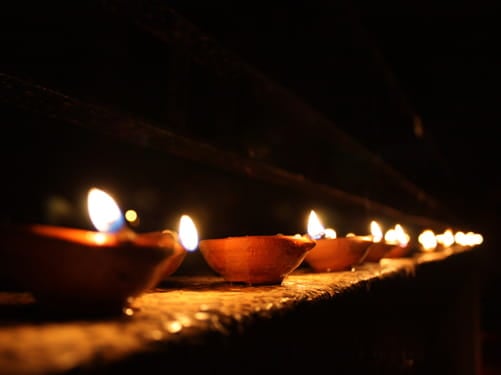As Lemle arcs between past and present, the feeling conveyed is one of steady reassurance. We witness how Ram Dass has used the challenges life has presented to deepen his exploration of the nature of consciousness and his reverence for the strength of human spirit.
Indeed, perhaps the film's most affecting moments are to be found in Ram Dass's halting, repetitive speech, which lends his words poetic import. His frequent "Yeah. Yeah," apparently intended to bridge the gaps between words, serves as a palliative mantra. If nothing else, watching him sit in his wheelchair amid an array of Buddha statues, selecting each word and presenting it with studied effort and attention, is sufficient testimonial to his creed: "Be Here Now." (In the early 70s, Ram Dass's book of that title was the third best-selling book in the English language.)
The documentary's opening scenes focus on the effects of his stroke, his physical therapy, and his discovery of equanimity within his life's new limitations. "The suffering comes when you try to hold onto continuity," Ram Dass remarks. "Our lives are grist for the mill. Grist for the mill." It is the characteristic repetitions like these that give the film its resonance, in turn its own grist.
Lemle treats us to footage of Ram Dass's (then Richard Alpert's) privileged New England childhood, pole vaulting, sneezing, selling worms. We witness his transition to a "spit and polish Harvard professor," followed by his notorious expulsion in 1963 along with Timothy Leary, for their experiments with LSD. We visit hazy scenes of the experimental drug commune the two started, followed by his trip to India and life-transforming encounter with Maharaj-ji, the guru who gave Ram Dass his name.
Ram Dass took to heart Maharaj-ji's charge, "Serve people; feed people." Upon his return to the States, hordes of hippies descended upon his family's 300-acre estate, to his family's bafflement. "It's all just enough," he reassures his tie-dyed disciples, new beard wafting in the breeze.
In one of several similar scenes shot post-stroke, Ram Dass comforts a girl whose boyfriend has recently been killed. She recounts a dream in which her boyfriend tells her if she ever finds another love, "I'm a part of it." This reduces Ram Dass to stuttering tears. "That's strong," he tells her. "The depth of a lover is a path." And she helps him to his feet.
"I'm more at peace now than I have ever been," Ram Dass assures us in the final shot. "This moment is all right. Now. This moment is all right. Yeah. Yeah." And so the wheel comes round again.
Ram Dass: Fierce Grace will open this March at the Film Forum in New York City and at the Rafael Film Center in San Rafael, California.

